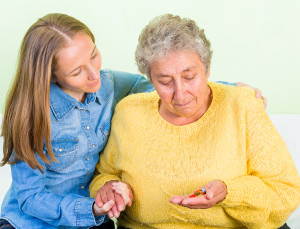 Whether we are caring for an elderly adult in our home or visiting them where they stay, it is important to know the signs of elderly vitamin deficiencies so we can help get our loved ones back on track. One of the most common deficiencies is water!
Whether we are caring for an elderly adult in our home or visiting them where they stay, it is important to know the signs of elderly vitamin deficiencies so we can help get our loved ones back on track. One of the most common deficiencies is water!
As we wrote in an earlier article, dehydration is very common in aging adults, and can lead to a variety of health concerns, including constipation, increased risk of cold and flu, decreased energy levels and decreased absorption of vitamins. As we age, our digestive systems are not as effective as they used to be, due to reduced levels of digestive enzymes and stomach acids. This causes us to absorb less vitamins. These few in particular:
Vitamin B12 – maintains healthy nerve cells and red blood cells
deficiency symptoms: diarrhea or constipation, fatigue, loss of appetite, balance problems, shortness of breath, confusion, depression, pale skin or gums, numbness
Folate – not just for pregnant women! Folate is important for brain function and heart health for everyone, and we absorb less as we age
deficiency symptoms: anemia/pale skin, fatigue or weakness, diarrhea, poor appetite, weight loss, irritability, headaches, sore tongue
Vitamin B6 – for healthy nerve function
deficiency symptoms: tingly hands/feet, fragile skin, anemia
Many of these symptoms are common in older adults, especially in those with dementia. But it is important to get regular blood work done, and to make sure your love one’s doctor is ordering tests for these specific nutrients. Supplementation of any of these vitamins may make a big difference in quality of life.





